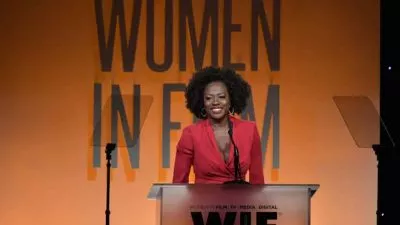By Diana Evans, The Guardian
Many of us had existential thoughts during lockdown, and assuaged them with new hobbies. We did thousand-piece puzzles. We crocheted and knitted. We learned new songs on our guitars, baked overzealously, and connected with our plantlife. For Viola Davis, knocking around in her $5m mansion in Toluca Lake, Los Angeles, it was writing, though the nature of it was less assuagement than staring into the coalface of an existential crisis. Who am I? What is my life supposed to mean? If this isn’t it – the Oscar winning, the formidable trail of accolades, the palatial bathrooms and saltwater pool – then what is?
“I lost my mind during the pandemic,” she tells me from her bedroom, dressed pre-photoshoot in a grey sweatshirt and loose woollen hat. “I just wandered around this house like Mary Tyrone in Long Day’s Journey Into Night.” She laughs about it (she has a deep laugh and a deep, mighty voice inherited from her grandmother), but the memoir resulting from the time spent writing is anything but light. She has a story to tell, a gripping, emotive, at times spine-tingling story, with pathos and pain, triumph and redemption, setting a new benchmark for the celebrity confessional. Finding Me is a page-turner, written with narrative knowhow and stylistic competence.
Over a matter of months – interrupted by the filming of The First Lady, in which she plays Michelle Obama, and The Woman King, a historical drama set in the Kingdom of Dahomey (now southern Benin) in west Africa, both projects from her company JuVee Productions – she grappled on the page with the spectre of her poverty-stricken childhood and her subsequent thorny rise to the top, a place that turned out to be less comfortable than imagined.
“Whenever you’re still, whenever you’re quiet, whenever you put everything down, then everything in your life comes into full focus. It comes at you like a jackhammer,” she says of the big, Covid-induced pause. But it was not only the pandemic that led her to the blank screen. The crisis was already in process. “I think it’s been happening ever since my status started to rise,” she says. “When it first rises, it’s nothing but excitement, nothing but an understanding that this is a culmination of your hard work, your talent. You just feel like God has blessed you – I still feel that.
“And then it moves along: what no one tells you about being ‘on top’ is the minutiae of it, the cost of it, the pressure of it, the responsibility, and finally the disillusionment. You feel like you’ve found something you love to do and you’ve made it, your life’s all sewn up – and then you hit it, and it’s just a level of emptiness, of wondering what your life means, and then you crash and burn. I had to go back to the source and revisit my life, revisit my stories, to sort of catapult me into something so I could find home – find me. I’d been lost in it all.”
In 2016, with her Academy Award win for best supporting actress for her role in Fences, based on an August Wilson play, Viola Davis became the first African American to achieve the triple crown of an Oscar, Tony and Emmy for acting (the Tony was for a Broadway role in Wilson’s King Hedley II; the Emmy for the TV legal thriller How to Get Away With Murder). She is the most nominated Black woman in the history of the Academy Awards (she received nominations for Ma Rainey’s Black Bottom, another Wilson adaptation, as well as The Help and Doubt) and has been ranked in the top 10 of the New York Times’ list of the greatest actors of the 21st century. Her execution of her roles is both exacting and magnanimous, ever astute, possessing a haunting integrity that makes each character seem profoundly known, tangible and self-possessed.
The consummate humble artist, she deems fame and glory secondary to the work; she is modest about her trophies, and dismissive of efforts by her actor husband of almost 19 years, Julius Tennon, and their adopted daughter, Genesis, to splash them around the house. “If it were up to me all the awards would be in the garage,” she says. “I mean, it’s just not my style – it’s a bit too much. Listen, it’s not that I haven’t looked at the Oscar or whatever and thought: wow, that’s pretty awesome. I’m very grateful, but, you know, you can’t live there. Soon as you get it, you walk off the stage, you’re an Oscar winner, but then it’s like, and now what? And then you gotta go on to the next job, and start all over again with that impostor syndrome.”
Click here to read the full article on The Guardian.



